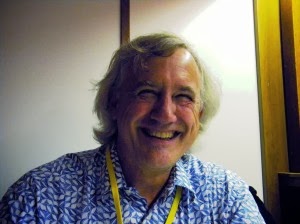This week we continue with Barry Cipra’s life story and delve more into his career, whilst see just how much luck you need to enjoy a career in science journalism.
________________________________________________________________
________________________________________
How did you get your big break?
 |
| Figure 1. Barry Cipra. Photo by Marlene Knoche |
I had links with Lynn Steen from when I was St Olaf’s college. He is a very good writer and was very active in maths education. Early on he discovered that I was a fairly good writer and I often spoke to him about taking my mathematical writings further. In my mind I would follow in the popular science footsteps of Martin Gardener, or Ian Stewart. I had no notion of science writing as a journalist. It was Lynn that pushed me towards reporting.
It was around this time, early 1987, that Gina Kolata left Science magazine for the New York Times. She had done all of the maths news reporting for Science magazine. Lynn, being amongst other things the maths secretary of AAAS, which publishes Science magazine, called up the editor and put my name forward. Much of the credit, and blame, for what I have become is directly attributable to Lynn Steen!
It only dawned on me later how unusual it was to get a call from the editor of one of the most prestigious journals in the world and have them ask me to write for them. That’s why I always try and offer any help I can give to the new generation of science writers.
As you say, you were very lucky to get your big break into science journalism. Do you think it is easier, or harder, now-a-days to make a career in science writing?
Honestly, I don’t know.
What is true is that because there are so many more possible sources of self publishing there are many more people doing it. Most of this is unpaid and done purely as a hobby, but occasionally it does attract attention of people which then pushes them towards further opportunities. In essence it’s a buyer’s market. Editors have more choice of science writers to choose from.
What is your favourite area to report on?
I try to report on as wide a range of topics as possible, so I don’t get trapped in a single niche. I enjoy reporting on the applications on mathematics, not only because they’re very important, but also (being a lazy journalist) you can easily connect it to your audience’s experiences.
One of my favourite stories was from mathematical economics, where they were trying to match donors and recipients for kidney transplants. Alvin Roth, the man behind this research, recently won the economics Nobel prize, partly for this work. I like to think my article bought his work to the attention of the judges!
Overall it’s a good topic because the problem is easy to explain, the mathematics is fairly simple and the dramatic outcome is amazing. Importantly, with just a little maths you gain the ability to prove that your system is completely resistant to people trying to cheat the system.
Perhaps my favourite piece of all time was on rotationally symmetric Venn diagrams. It was easily explainable maths linked with incredibly beautiful results.
[Barry expanded on this greatly and will be the subject of an article later]
What advice would you give to the next generation of science writers?
Firstly, I would say: don’t do it! I was very lucky to get the breaks I did. However, if that doesn’t dissuade you I would firmly recommend one of these formal science writing courses, such as the one University of California, Santa Cruz. They produce first rate reporters, who all speak highly of the program.
A key piece of advice I can give for a successful career in journalism is find a good editor and be able to take criticism. By the very nature of writing it is very easy to get into a mental rut of saying things in one way. It is very useful to get someone else to look at your work and give an alternative explanation.
________________________________________________________________
________________________________________
Although this is the end of Barry’s biography, we are not done with him yet. Over the next few posts I will highlight a few of the beautiful puzzles and games that he introduced to me.
Thank you...
ReplyDeleteYou're welcome.
ReplyDelete